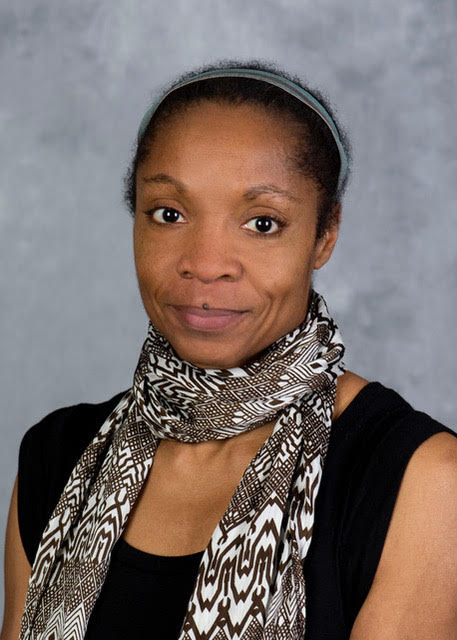Since 1996 Volume XXIIV
Allison Joseph

Allison Joseph lives in Carbondale, Illinois, where she is part of the
faculty at Southern Illinois University. She serves as editor and poetry
editor of
Crab Orchard Review,
moderator of the Creative Writers Opportunities List, and director of
Writers In Common, a summer writers’ conference. Her books and chapbooks
include
What Keeps Us Here
(Ampersand Press),
Soul Train
(Carnegie Mellon University Press),
In Every Seam (University of Pittsburgh),
Worldly Pleasures
(Word Tech),
Imitation of Life
(Carnegie Mellon),
Voice: Poems
(Mayapple Press),
My Father's Kites
(Steel Toe Books),
Trace Particles
(Backbone Press),
Little Epiphanies
(Night Ballet Press),
Mercurial
(Mayapple Press),
Multitudes
(Word Tech),
The Purpose of Hands
(Glass Lyre Press),
Mortal Rewards (White Violet Press),
Double Identity (Singing Bone Press),
What Once You Loved (Barefoot Muse Press),
Corporal Muse (Sibling Rivalry), and
Confessions of a Barefaced Woman (Red Hen Press). She is the
literary partner and wife of Jon Tribble.
In the
Public Library
In silence, in
shadow, this girl reads words–
sounds discrete
as bricks, jagged as shards
of bottles
smashed against the library’s
concrete steps,
its entrance an alley
reeking of
piss, booze, its pavement
giving way,
cracked along city fault lines.
Inside, one
room of warmth and dirt,
floor wax and
gum wrappers, paperbacks
thumbed and
stamped with inky due dates,
hardcovers
wrapped in yellowed cellophane,
tables and
chairs with initials carved
into them,
damage sunk deep in wood.
Here I learn
the potency of words,
their sounds
resounding in my head,
ears,
equilibrium shaken,
words destined
for my preteen ribcage,
my body a bony
geometry. Here,
the hours teem
with voices, their rhythms;
coiled tense, I
lean on words and love
all this–broken
bindings, smudged print,
fondled pages,
my library card,
warm slip
frayed in my taut grip.
Reading
Room
Back before we
all became "multicultural,"
when blacks
were beautiful in dashikis
and righteous
rage, my father sold books
in Toronto,
books of pride, sorrow, anger,
an inventory
that ended up
in our living
room in the Bronx,
a reading room
I'd sneak into
when I wasn't
supposed to,
my chore and
duty there to dust
the coffee
tables and knickknacks—
souvenir
ashtrays from Caribbean isles,
ebony elephants
and pelicans,
hand carved,
foreign-wrought.
Mixed in among
my mother's
nursing texts,
her medical dictionary
and anatomical
tomes, I found
Franz Fanon's
Black Skin, White Masks,
a book too
severe for my pre-teen brain,
polysyllabic
paragraphs sailing past
my
short-sighted mind, Cleaver's
Soul On
Ice,
which I read fervently,
loving every
curse, every mention of sex,
missing the
revolution in his prose
in pursuit of
dirty words, staring
at the cover,
captivated by Eldridge's
prison-saddened
face.
Up From
Slavery,
Manchild
in the Promised Land,
The
Crisis of the Negro Intellectual,
poems of
Cesaire and Senghor--those books
filled me with
legacy, history, located me
with Jesse
Owens, blazing his body
past fascism as
he triumphed
at Hitler's
Olympics, with Jackie Robinson
through minor
and major league hatreds,
with George
Washington Carver as he
synthesized
genius from peanuts.
Malcolm X spoke
to me from the cover
of his
autobiography, black and white
photo faded,
but his face still sharply
turned upward,
his finger up, out,
to signal the
better world beyond us.
Could I join
these men if I let words
dream in me, if
I struggled, didn't
settle, my gaze
as bold and forthright
as Frederick
Douglass's, Booker T.'s ?
Wiping each
book clean, I kept that room's
order, my torn
rag mottled, spotted,
dark with that
week's dust.
Nothing
But Words
could comfort
me, so I sat in the arm chair
silently,
hoping somehow my presence
could make your
bed rest easier,
your lungs no
longer home to ache and cough.
You smiled to
see your youngest, lanky at 15,
secretive, that
girl, with her words and pages
--asked,
what are
you writing, what are you
writing,
with breath
that faltered from your failing lungs,
past your lips,
lips too dry, cracked. Too weak
to lift your
arms, you needed help to grasp
the plastic
water tumbler always at bedside.
Ashamed, I knew
my poems were too dainty
for that
sickroom, precious but
hardly powerful
enough,
not nearly as stately as the daily prayers
you craved,
piped in on gospel radio.
I should have
showed you what about words
engaged me so,
should have read
my shaky scrawl
aloud--nothing good
about my
shyness, my silence,
nothing shared
except your hushed query,
Daughter,
Mother, Sister, Wife
When your
daughter is a poet,
burn all your
possessions before you die.
Or else she
will rifle through them,
searching for
that one bauble, that trinket,
that one letter
or card or bus schedule
to explain why
you were so cold, so reluctant
to pick her up
when she was nine,
when she was
nineteen. Burn all
your
correspondence; but be warned,
she’ll make
something of the cinders.
When your
mother is a poet,
your breakfast
may be marmalade
and wine, wheat
toast and dandelion
stems. She may
slit a fish’s belly open
in a gesture so
sudden and swift
that you can
never eat fish again,
her eyes
gleaming with conquest.
When your
mother is a poet,
you may get
crumpets, not pizza,
gravy but no
potatoes.
You may not get
fed at all.
When your
sister is a poet,
she may steal
your stories
for her own,
her life’s humiliations
not nearly as
intriguing as yours.
She’ll become
the one whose left breast
popped out of
her prom gown;
she’ll be the
one with the extra-smarmy
dentist, the
one at your father’s
graveside,
mother’s deathbed.
She will send
these words off to strangers,
and not discuss
one page of it with you.
When your wife
is a poet,
watch your
mouth. Anything you say
can and will be
used, anything you do
preserved
whether you think it should be
or not. She may
quit being your wife,
but she will
never quit searching her memory
for that awful
thing you said
in the delivery
room, the laundry room,
the bedroom,
the kitchen.
And she will
write it down
in that
penmanship you always loved–
an ornate
script that looked
like another
era’s handiwork,
malice
controlled by curves
and loops in
ink, swelling on paper.
Regrets
I should be
watching my weight, counting calories,
doing leg lifts and squat thrusts, but instead I’m under
six layers of thermal blankets, watching
Saturday morning cartoons featuring
robots that look like animals
or animals that
look like robots.
I should be
writing letters on custom-made stationary,
engaging notes to long-lost friends—
high school buddies, college pals—
instead of reading gossip on the Internet
about celebrities I’ll never meet
and don’t really like.
I should be
doing something productive in life:
writing better poems, cooking exotic cuisines—
but instead I’m eating noodles from a styrofoam cup,
doodling in the margins
of blank notebooks, writing tablets.
I should be
growing herbs in a lush garden
overflowing with fragrant sprigs of basil and thyme—
instead I’m at the grocery store
buying pre-washed lettuce in plastic bags,
wilted greens soggy under florescent lights.
I should be
smaller, fingernails longer,
scars cleared up, moles gone,
fingers elegant enough to make
spanakopita, dim sum, minced meat pies, samosas.
I should learn
cake decorating--
swirling frosting in elaborate creamy peaks
on a cake so magnificent no one ever cuts it.
Instead I’m scarfing down Little Debbie snack cakes
behind a locked office door.
I should be a
woman who doesn’t say
I should be,
no regrets about her growing waistline
or shrinking life span,
no regrets about choices made or unmade,
no efforts at sophistication left.
I should be
tired of everything
unfaithful to everything
unwilling, unready, unlovely.
I should be,
but I’m too familiar
with what I can’t be
and I can’t stop thinking
I should be that woman
who can tell one plant from another,
who saves the early shoots
of tomatoes and carrots
instead of mowing them down,
mistaking them for weeds.
Permission granted
from Red Hen Press for these poems that appear in the book by the
author,
Confessions of a Barefaced Woman: “In the Public Library,”
“Reading Room,” “Nothing but Words, "Regrets."
PoetryMagazine.com is published by Gilford Multimedia LLC www.nycny.net
Mary Barnet
Andrena
Zawinski
Grace Cavalieri
Joan Gelfand
Janet Brennan
Reviews
Video
Podcasts
Submissions
Advertising
